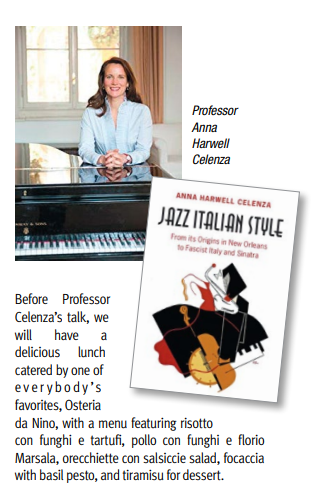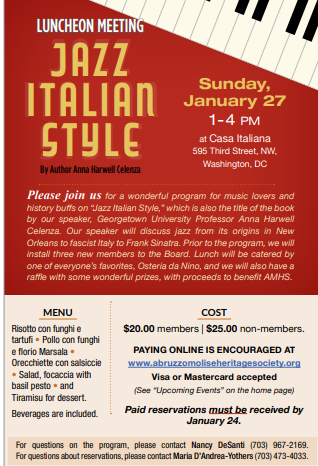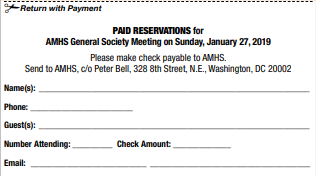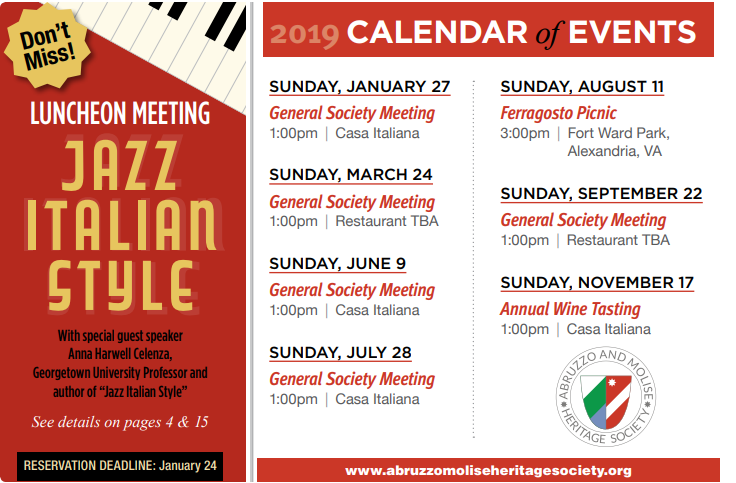Story of “Jazz Italian Style”
Revealed by Music History Expert
By Nancy DeSanti
For our first program of the new year, we are pleased to present a wonderful speaker, Professor Anna Harwell Celenza, who is an expert in music history and the author of a book, “Jazz Italian Style: From Its Origins in New Orleans to Fascist Italy and Sinatra.” The program will be held on Sunday, January 27, 2019, at 1:00 p.m. in Casa Italiana.
Who better to give us the whole story about this fascinating subject than Professor Celenza, who has a Ph.D. in music history from Duke University. She is currently a professor of music at Georgetown University, where she teaches courses in music history and radio journalism. She is the author/editor of several scholarly books, including “Hans Christian Andersen and Music: The Nightingale Revealed” (2005) and “Music as Cultural Mission:
Explorations of Jesuit Practices in Italy and North America” (2014). She has also published articles on a wide range of composers, from Franz Liszt and Gustav Mahler to Duke Ellington, Billy Strayhorn and Frank Sinatra. In addition to her scholarly work, Professor Celenza has been a writer/commentator for National Public Radio’s Performance Today and published eight award-winning children’s books, including “Duke Ellington’s Nutcracker Suite.”
Her work has been featured on nationally syndicated radio and TV programs, including the BBC’s “Music Matters” and “Proms Broadcasts,” and C-Span’s “Book-TV”. Professor Celenza said she first starting thinking about writing “Jazz Italian Style” when she was on a year-long sabbatical in Rome. Her book examines politics, immigration patterns, economics and technology. In explaining the largely forgotten Italian connection to jazz, the book will attract readers interested in music history, Italian-American culture, the Fascist era in Italy, music technology, and the evolution of popular music.
The book explores a complex era in music history, when politics and popular culture collided with national identity and technology. When jazz arrived in Italy at the end of World War I, it quickly became part of the local music culture. Thanks to the gramophone and radio, many Italian listeners paid little attention to a performer’s national and ethnic identity. As the author notes, Nick LaRocca (Italian-American), Gorni Kramer (Italian), the Trio Lescano (Jewish-Dutch), and Louis Armstrong (African-American), to name a few, all found equal footing in the Italian music world. The book reveals how Italians made jazz their own, and how, by the mid-1930s, a genre of jazz distinguishable from American varieties and supported by Mussolini began to flourish in northern Italy and in turn influenced Italian-American musicians.
And importantly, the book recovers a lost repertoire and an array of musicians whose stories and performances are compelling and well worth remembering. The book also features less well-known facts such as that Benito Mussolini’s son Romano was an internationally recognized jazz pianist who played with Duke Ellington, Lionel Hampton and Dizzy Gillespie. Mussolini himself played the trombone and then the violin and was a music reviewer for a socialist newspaper when he was in his 20s. Before Professor Celenza’s talk, we will have a delicious lunch catered by one of e v e r y b o d y ’ s favorites, Osteria da Nino, with a menu featuring risotto con funghi e tartufi, pollo con funghi e florio Marsala, orecchiette con salsiccie salad, focaccia with basil pesto, and tiramisu for dessert. So please invite your family and friends and be sure to make your reservations by January 24, 2019.





